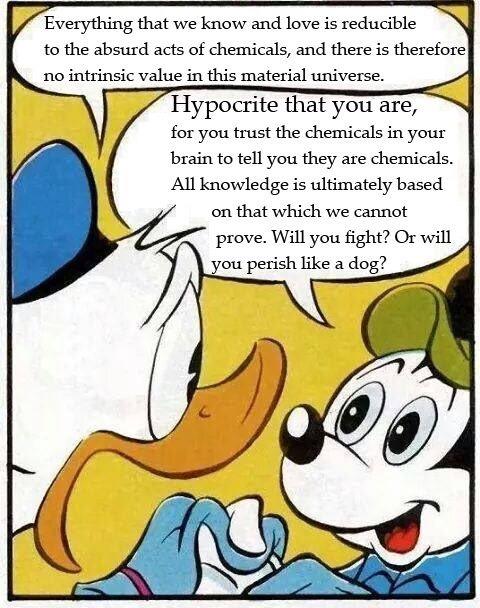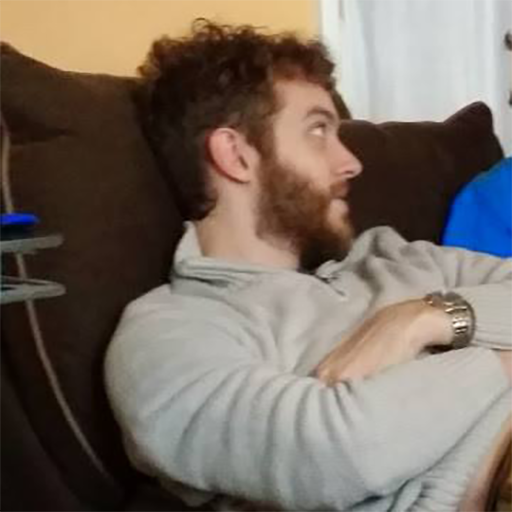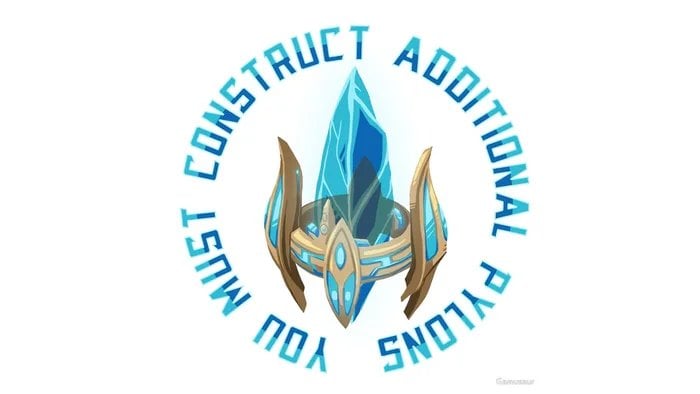
That’s a clever joke. I however have radical freedom!
Chooses to put the book outside
Haha, fuck fate. I have free will!
Throws the book in the fireplace
The predetermined universe smiles when the book’s fate is being fulfilled.
Unless we have a way to find out what that predetermined future is, it’s irrelevant and you should proceed as if it isn’t a thing.
So you’re saying turn to page 72.
If you like. You can also be a rebel and turn to a different page or stop reading the book altogether.
But then I’ll never know how it ends!
Then you can follow the path created by the author! This kind of reminds me of The Stanley Parable.

“When Stanley came to a set of two open doors, he entered the door on his left.”
But the book only has 71 pages
Pg 72 is in volume 2.
If you are interested, buy volume 2. Else, buy volume 2.
When I was like 7 my mom bought me a choose your own adventure book. I tried to read it cover to cover and was very confused.
So if you read it cover to cover, what did you think the instructions were about? What about the “turn to page X” parts?
I’m not judging - this is exactly the sort of oblivious thing I would’ve done as a kid too - but I’m curious how it happened.
I specifically remember doing this with one of the goosebumps choose your own adventure. There was a good ending page that referenced nirvana (the idea not the band) and I read that thing end to end choosing both choices for everything. No page ever sent you to it. It was just a contrivance that you were sent to glance at while flipping through.
Okay that’s kind of amazing, you found an easter egg in an out of bounds area.
One cauld rightfully argue “determination” and “predetermination” are wildly different concepts. The comic is wrong on this. But let’s go page 72 anyway
I’m taking my towel to page 42. You can’t fool me!
I didn’t know Fallout 4 had a graphic novel!
Hell yeah how good is determinism
That is yet to be determined.
Source?
The deterministic universe may one day force you to visit your local library.
Your mind is a computer attempting to optimally fulfill several prerogatives which are determined primarily through evolutionary pressures. It is free to do this in the way it sees best and is free to adapt as the environment in which it operates changes, in the sense that it is not forced to override it’s internal decisions and come to a different conclusion regarding how to act. I consider this to be free will. You may disagree, but that would be haggling over definitions, rather than facts.
Crucially, this definition is true regardless of whether the universe’s course is predetermined or not. I personally don’t think it is, because a good chunk of the universe is random and I find it hard to believe that that randomness was predetermined.
Being “free” to take in inputs and then output the corresponding outputs like a computer isn’t what anyone I know would call “free will.”
Redefining free will as exactly what a computer running code would do doesn’t make sense to me.
My argument would go something like this: If you are the computer, then it is free will. If you could predict the computer, you could argue, but you can’t. You can’t even do this theoretically since you’d need more mass than the universe and can’t initialize your predictive model. So you can only say “that decision was made inside that brain”. That is at least one sensible definition of free will.
It’s like looking at a motor that breaks down and then saying that it’s not really the motor that breaks because the motor had no choice in it’s parts breaking. That’s just rhetoric.
The error I believe is that we don’t want to accept that sentience can arise from mechanical universe and it’s a matter of degree and that this can create meaning. People want to set the bar higher because they want the idea of some type of “pure mind”. But since we’re already discussing the meaning of all these things, arguing that what you are reading is just quantum physics is rhetoric.
Either what you are saying is supposed to be meaningful, or you concede that your words are meaningless. Then I anyone else wins the argument by default ;)
Basically the definition of free will can only be made by someone who claims that meaning exists, emerging from the material world. Therefor within that emergent layer of mind and meaning, a definition of free will other than basic physics is at least acceptable.
The error I believe is that we don’t want to accept that sentience can arise from mechanical universe and it’s a matter of degree and that this can create meaning. People want to set the bar higher because they want the idea of some type of “pure mind”. But since we’re already discussing the meaning of all these things, arguing that what you are reading is just quantum physics is rhetoric.
I don’t follow. It sounds like you agree that the concept of a “pure mind” is ridiculous, so I’m not sure what you mean by your last sentence.
I also don’t think of free will in terms of predictability. I think of it like this: if you could recreate this moment an infinite amount of times, you would always “choose” to do/think/react the exact same way every single time.
Well imagine we could copy or approximate a human mind and run it on a typical computer, free from an quantum effects. From the outside you would say “no this is not a mind, this is a computer!” (I threw it on the ground). You could restart a human mind simulation (which would be deeply unethical of course) and it would return the same results, but it would still not be predictable outside of such a simulation.
But from the inside your mind you would of course say you have free will because that is how you defined it. The word has meaning because we created the meaning. In a universe with only such PC based human minds, you wouldn’t argue that you don’t have free will because we’re just software running silicon chips. Otherwise you’d have to invent a new word for what you meant with free will, like internally derived mental agency or something. But that is just rhetoric.
A classical computer based human mind would in fact be more free since it could investigate, analyze and edit it’s own mind, overcoming things that it perceives as weaknesses or faults. Like my evolutionary programming might have made me biased to conserve energy and time and not think too hard on certain new information, dismissing it instead. Maybe instead you’d want to be more open minded. That still would be repeatable and deterministic but arguably more free than a normal human mind.
So I think arguing that free will is based on determinism, repeatability or predictability is sort of an appeal to a “pure mind”. Not sure if that is a good way to put it, but like appealing to higher standard like we’re supposed to be a supernatural soul or something. We’re not, but we still came up with that word all on our own.
It’s so funny and interesting how completely differently we feel about this haha
But from the inside your mind you would of course say you have free will because that is how you defined it.
No I wouldn’t say that. And that’s how compatibilists have re-defined free will, it’s not what people generally think of when they think of free will. “You don’t have a choice, but you just feel like you have a choice, which is actually free will” is not a statement most people would agree with.
In a universe with only such PC based human minds, you wouldn’t argue that you don’t have free will because we’re just software running silicon chips.
Yes I would. I’m also arguing that now about our human based human minds.
Otherwise you’d have to invent a new word for what you meant with free will, like internally derived mental agency or something.
Or, I could just accept that free will doesn’t exist, it’s a fake feeling. Similar to how love feels like it comes from the heart but it’s all in the brain.
We have consciousness, and are self aware. But the universe is deterministic and there was never any other choice you could have made at any point in your life. A million times over and you would have always done exactly the same things, and had the exact same chemical reactions to the stimuli you experienced. It’s not a contradictory world view, and it doesn’t require any form of free will, let alone redefining it. But people get uncomfortable thinking about it so it often gets rejected out of hand.
Yeah I’m just arguing for fun :) But I do think questions like this might become relevant in the foreseeable future with AGI. Kurzgesagt has an interesting video on free will in case I haven’t linked that already.
that’s how compatibilists have re-defined free will, it’s not what people generally think of when they think of free will
I’d still argue this is a kind of category error made by philosophers. The concept of free will existed within human minds before philosophers mused about it. It’s a very useful concept for minds regardless of the true nature of our physical universe.
Concepts can exist without being “real” as in a phenomenon in the physical universe outside of minds. Concepts can exist only in minds, many do. You could argue money isn’t real except in our collective consciousness. But what does that mean?
Or you could for example say that humans don’t exist because all you see is quantum physics. Waves in water don’t exist because only molecules or even just subatomic particles exist. Just as quantum physics can’t tell you anything about the concept of “wet pants” from wading through the ocean, it can’t tell you anything about free will.
I don’t know if our universe is deterministic or not, from what I understand waveform collapse casts some doubt about this. But even if you had human minds on deterministic computer hardware, I’d say the conclusion doesn’t follow.
Just because I’d always make the same choice under the same conditions, doesn’t mean I didn’t make a choice.
I do agree that “free will” in a deterministic universe isn’t as cool as I’d like to be. I guess that is what I mean with “pure mind”. There is an unease there or an embarrassment of thinking of yourself as just a flesh brain. But how WOULD a pure mind with true free will decide given the same circumstances? Non-deterministic with some random influence? Wouldn’t that be the an illusion as well?
What else is free will but a conscious decision based on thinking and inputs, however that works?
Maybe the better question is to what degree do we have free will in a certain environment. Just as consciousness might have degrees.
I’d be curious what you would call “the phenomenon previously known as free will”? And what conclusions would you draw if free will doesn’t exist, what would be the impact on ethics, law and sociology? Does it all topple like a jenga tower? Does none of it mean anything?
I genuinely am enjoying your comments, it’s a super interesting topic and you have good points.
Just because I’d always make the same choice under the same conditions, doesn’t mean I didn’t make a choice.
This might be another point of us misunderstanding each other. I would argue that it’s not that you always would make the same choice. I’d say that you couldn’t ever make a different choice. In a vacuum, I think it looks like the same outcome, but I think it’s subtly different if you look at it more generally, like a system of choices/interactions.
I guess that is what I mean with “pure mind”. There is an unease there
I know what you mean, it made me very uncomfortable when I first learned about this point of view. But some eastern cultures/philosophies don’t have the same individualistic/“liberal as in libertarianism” mindset when it comes to personal choices and outcomes, so I imagine that unease is partially due to our cultural upbringing.
What else is free will but a conscious decision based on thinking and inputs, however that works?
I think a lot of what people experience as free will is just rationalization after the fact based on past experiences and internal belief/value systems. Similar to how split-brained people don’t just invent provably false stories explaining why they did something, they believe the false stories that their brain invented after they had already performed the actions.
On a real world, practical level, I think accepting this doesn’t really change interactions on a personal level, but more shifts the macro/societal level of cause and effect. Maybe instead of expecting kids to just choose to apply themselves better at school, we focus more on methods that improve outcomes, as overly basic example.
I’d be curious what you would call “the phenomenon previously known as free will”?
I haven’t given it any thought, and I’m not sure it matters. What would you call “the phenomenon previously known as soul/thetan/djinn”? I don’t believe the phenomenon exists, I don’t think I’d need a name for that. If we’re being super semantic I guess “agency” somewhat works.
And what conclusions would you draw if free will doesn’t exist, what would be the impact on ethics, law and sociology? Does it all topple like a jenga tower?
I don’t think it means we stop penalties for crimes, if that’s what you mean. I think society is a system, and the existence and application of penalties on unwanted/harmful behavior along with rewards for wanted/beneficial behavior shift the balance of actions and behaviors of the system on a whole for the better, as individual systems (not just people, but families, peer groups, etc) work to maximize outcomes for themselves or their value systems.
Does none of it mean anything?
Plenty of philosophies think we don’t have free will, and none of them have advocated for or turned into suicide cults, so don’t let this turn you off from the thought. I think we experience what we experience, and free will doesn’t cheapen that. Enjoying and valuing what we have and what we experience for what it is instead of for what effort you went through to earn it is already a part of many people’s value systems, so I don’t believe it actually takes a large personal shift for most people.
And yet I can speak about my consciousness, and therefore deliver information to you based on an experience which can’t be physically observed or quantified.
Perhaps the universe is naught but a comforting illusion.
deliver information to you based on an experience which can’t be physically observed or quantified
I’m not sure if “Black Box of electro-chemistry” is necessarily the same as “Non-determinism”.
That said, we contain the ability to observe and react to our surroundings which causes a large and complex web of interactions that aren’t trivial to map or anticipate.
That unpredictablity is what we ultimately define as freedom.










